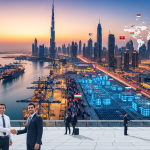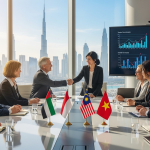Dubai’s Non-Oil Trade Sector Sets New Benchmarks in Q2 2025
Dubai’s economic landscape continues to evolve at a remarkable pace, with the emirate’s non-oil trade sector achieving unprecedented growth in the second quarter of 2025. According to recent data released by Dubai Customs, the city recorded a significant surge in non-oil exports, reinforcing its position as a global trade hub. This growth, driven by innovative policies, strategic partnerships, and robust infrastructure, signals a wealth of opportunities for businesses and investors looking to capitalize on Dubai’s dynamic market.
For companies and entrepreneurs aiming to tap into this thriving sector, partnering with a trusted consultancy like Persian Horizon can provide the necessary guidance to navigate the complexities of Dubai’s trade landscape. This article delves into the factors behind this record-breaking performance, the industries leading the charge, and the implications for businesses eyeing expansion in the UAE.
Key Drivers of Non-Oil Export Growth in Q2 2025
The impressive growth in Dubai’s non-oil trade sector during Q2 2025 can be attributed to several strategic initiatives and global economic trends. Dubai Customs reported a 22% year-on-year increase in non-oil exports, with key markets in Asia, Europe, and North America contributing significantly to this uptick. The emirate’s ability to adapt to changing global trade dynamics has played a pivotal role in sustaining this momentum.
One of the primary drivers is the UAE’s focus on diversifying its economy away from oil dependency. Through initiatives like the Dubai Economic Agenda (D33), the government has prioritized sectors such as manufacturing, technology, and logistics. These efforts have created a fertile ground for exporters to scale operations and reach international markets. Additionally, Dubai’s world-class infrastructure, including Jebel Ali Port and the Dubai World Central (DWC) logistics hub, continues to facilitate seamless trade flows.
Another contributing factor is the UAE’s network of free trade agreements (FTAs) with major economies. These agreements have reduced tariffs and trade barriers, making Dubai an attractive base for exporters. Businesses looking to leverage these opportunities can benefit from expert advice on market entry strategies through resources like the Blog section of Persian Horizon, which offers in-depth insights into UAE trade policies.
Top-Performing Industries in Non-Oil Exports
Several industries have emerged as frontrunners in driving Dubai’s non-oil export growth. The manufacturing sector, particularly in food and beverage processing, recorded a 28% increase in export volumes compared to the same period in 2024. This growth reflects Dubai’s growing reputation as a hub for high-quality, halal-certified products catering to global demand.
The technology and electronics sector also saw a notable rise, with a 19% increase in exports. Dubai’s focus on fostering innovation through initiatives like the Dubai Future Foundation has attracted tech companies to establish their regional headquarters in the emirate, boosting export capabilities. Meanwhile, the pharmaceuticals and healthcare products segment reported a 15% growth, fueled by rising demand for medical supplies in international markets post-pandemic.
For investors interested in these high-growth sectors, staying updated with the latest market trends is crucial. The News portal on Persian Horizon provides timely updates on economic developments in Dubai and the wider UAE, ensuring businesses remain ahead of the curve.
Government Policies Supporting Trade Expansion
The Dubai government’s proactive approach to trade facilitation has been instrumental in achieving these results. In Q2 2025, new policies aimed at streamlining customs processes were introduced, reducing clearance times by 30%. Digital platforms like Dubai Trade have further enhanced efficiency, allowing businesses to complete transactions and documentation online with ease.
Additionally, the government has ramped up incentives for small and medium enterprises (SMEs) to participate in export activities. Financial support programs, export training workshops, and access to international trade fairs have empowered SMEs to compete on a global stage. These initiatives align with the broader vision of transforming Dubai into a leading export hub by 2030.
For companies seeking to establish or expand their presence in Dubai’s trade sector, understanding these policies is essential. Comprehensive Services offered by Persian Horizon can assist businesses in navigating regulatory requirements and accessing government incentives tailored to exporters.
Investment Opportunities in Dubai’s Trade Ecosystem
The surge in non-oil exports has opened up a plethora of investment opportunities across various segments of Dubai’s trade ecosystem. Logistics and warehousing, for instance, are witnessing heightened demand as companies seek to optimize supply chains. Investors can explore partnerships with logistics providers or invest in state-of-the-art storage facilities near major trade hubs like Jebel Ali.
Moreover, the growing emphasis on sustainable trade practices presents opportunities in green logistics and eco-friendly packaging solutions. Dubai’s commitment to sustainability, as outlined in its 2050 Energy Strategy, is encouraging businesses to adopt environmentally conscious practices, creating a niche for innovative startups and investors.
For those considering investments in Dubai’s trade sector, specialized Investment Consulting Services can provide tailored strategies to maximize returns while mitigating risks. These services are designed to align investment decisions with market trends and government priorities.
Challenges and Considerations for Businesses
While the growth in non-oil exports is promising, businesses must remain mindful of potential challenges. Global economic uncertainties, such as fluctuating currency rates and geopolitical tensions, can impact export profitability. Additionally, competition in key markets is intensifying, requiring businesses to differentiate their offerings through quality and innovation.
Another consideration is the need for compliance with international trade regulations. Exporters must stay abreast of changing standards in target markets to avoid penalties or shipment delays. Partnering with experts in Business Setup Services can ensure that companies are fully compliant with both local and international trade laws.
Strategies for Success in Dubai’s Export Market
To succeed in Dubai’s competitive export market, businesses should adopt a multi-pronged approach. First, investing in market research is critical to identifying high-demand products and emerging markets. Understanding consumer preferences and regulatory requirements in target regions can give exporters a competitive edge.
Second, leveraging technology can enhance operational efficiency. Tools like blockchain for supply chain transparency and AI-driven demand forecasting are becoming indispensable for exporters. Businesses can also explore digital marketing to promote their products globally, with tailored Sales and Advertising Services helping to craft effective campaigns.
Finally, building strategic partnerships with local and international stakeholders can unlock new growth avenues. Collaborations with logistics providers, trade associations, and government bodies can streamline operations and provide access to valuable resources.
Implications for Business Expansion and Gulf Region Trade
The growth in Dubai’s non-oil exports has far-reaching implications for business expansion and trade within the Gulf region. As Dubai strengthens its position as a trade gateway, neighboring countries in the GCC are also benefiting from increased cross-border trade. The UAE’s strategic location and robust infrastructure make it an ideal base for businesses aiming to access markets in the Middle East, Africa, and Asia.
For companies looking to scale operations or enter the UAE market, exploring Business Sales Services can provide insights into viable acquisition opportunities. Similarly, those interested in purchasing established businesses in the trade sector can benefit from Business Buying Services to identify and secure profitable ventures.
Future Outlook for Dubai’s Trade Sector
Looking ahead, Dubai’s non-oil trade sector is poised for sustained growth through the remainder of 2025 and beyond. Analysts predict that continued investments in digital infrastructure and sustainability initiatives will further bolster the emirate’s export capabilities. The upcoming Dubai Expo 2025 is also expected to attract global attention, providing a platform for exporters to showcase their products and forge international partnerships.
Furthermore, the UAE’s focus on fostering innovation and entrepreneurship will likely attract more foreign direct investment (FDI) into the trade sector. Businesses and investors who position themselves strategically now can reap significant rewards in the coming years.
For individuals and companies planning to establish a long-term presence in Dubai, securing residency through trade-related business activities is a viable option. Expert guidance on Residency and Citizenship Services can simplify this process, ensuring compliance with UAE immigration policies.
Conclusion: Seizing Opportunities in Dubai’s Trade Boom
Dubai’s record-breaking performance in non-oil exports for Q2 2025 underscores its status as a global trade powerhouse. With government support, cutting-edge infrastructure, and a commitment to economic diversification, the emirate offers unparalleled opportunities for businesses and investors. However, success in this dynamic market requires careful planning, compliance with regulations, and a deep understanding of global trade trends.
Whether you’re an exporter looking to expand, an investor seeking high-growth opportunities, or an entrepreneur planning to establish a foothold in Dubai, now is the time to act. By leveraging the right resources and expertise, businesses can thrive in one of the world’s most vibrant trade ecosystems.
Source: Gulf News UAE








